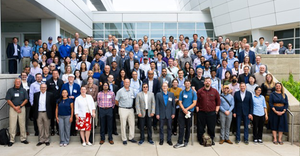PROFILES IN GARBAGE: Lead-Acid Batteries 8442
A battery is a device in which the energy of a chemical reaction can be converted into electricity.
Batteries range in size and use. Small, sealed button and six-volt batteries are used for consumer products. “Starting batteries” deliver a short burst of high power to start engines. “Deep-cycle batteries” deliver a low, steady level of power for electrical accessories, such as trolling motors on boats. Large industrial batteries have thicker plates and can supply low steady power for years.
A lead-acid battery consists of a polypropylene casing; lead terminals; positive and negative internal plates; lead oxide; electrolyte, a dilute solution of sulfuric acid and water; and plastic separators that are made from a porous synthetic material. More than 80 percent of the lead produced in America is used in lead-acid batteries.
Lead-acid batteries have the highest recycling rate of any product sold in the United States. This is because batteries are easily returned when a new battery is purchased and because a battery's lead and plastic components are valuable.
This profile is limited to lead-acid batteries used by motor vehicles.
Chaz Miller is state programs director for the Environmental Industry Associations, Washington, D.C. E-mail the author at: [email protected]
Lead-acid Batteries Municipal Solid Waste (MSW) Facts
Generated:
1.94 million tons or 0.9% of MSW by weight.*
13.8 pounds per person.*
106.6 million batteries were shipped by U.S manufacturers to end-users in North America in 2001.
A new lead-acid car battery is bought every 2.7 years.
Recycled:
1.87 million tons for a 96.4% recycling rate.*
9 states have battery deposit laws.
36 states require retailers to collect old lead-acid batteries from customers who buy new batteries.
Recycled Content:
A “typical” battery has 60 percent to 80 percent recycled lead and plastic.
Composted:
Lead, battery acid and plastic are not compostable.
Lead-acid batteries should never be placed in a composting pile.
Incinerated or Landfilled:
70,000 tons or less than 0.1% of discarded MSW by weight.*
Lead-acid batteries should not be incinerated due to some of the constituents of the battery.
41 states ban the disposal of lead-acid batteries in Subtitle D landfills.
Landfill Volume:
Negligible because of the high recycling rate.
Density:
An average car battery weighs 39 pounds.
An average truck battery weighs 53 pounds.
An average motorcycle battery weighs 9.5 pounds.
Source Reduction:
In 10 years, car battery cycles have increased from 2,500 to 6,000.
Industrial batteries can last 10 years to 20 years.
Recycling Markets:
Polypropylene casings are processed into new battery casings.
Lead is recycled into lead plates and other battery parts.
Battery acid is either neutralized, treated and discharged into sewers, or processed into sodium sulfate, which is a powder used in laundry detergent, glass and textile manufacturing.
Sources:
Battery Council International, Chicago, Ill. www.batterycouncil.org
“Measurement Standards and Reporting Guidelines,” National Recycling Coalition, Alexandria, Va. www.nrc-recycle.org
“Municipal Solid Waste Generation, Recycling and Disposal in the United States: Facts and Figures for 1998,” EPA, Office of Solid Waste, 2000. www.epa.gov/osw
Waste Age, Atlanta, “If They Ban It, Will It Go Away?,” October, 1993. www.wasteage.com
*2000 EPA estimates.
About the Author
You May Also Like




